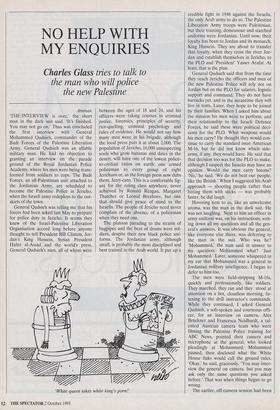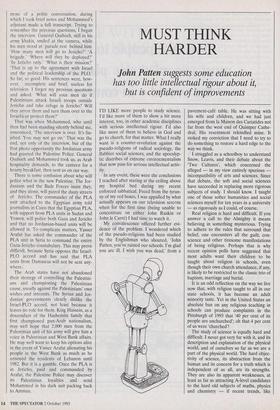NO HELP WITH MY ENQUIRIES
Charles Glass tries to talk to Charles Glass tries to talk to
the man who will police the new Palestine
Amman 'THE INTERVIEW is over,' the short man in the dark suit said. 'It's finished. You may not go on.' Thus was concluded the first interview with General Mohammed Qudsieh, commander of the Badr Forces of the Palestine Liberation Army. General Qudsieh was an affable military man. He had no objection to granting an interview on the parade ground of the Royal Jordanian Police Academy, where his men were being trans- formed from soldiers to cops. The Badr Forces, an all-Palestinian unit attached to the Jordanian Army, are scheduled to become the Palestine Police in Jericho, when the Israeli army redeploys to the out- skirts of the town.
General Qudsieh was telling me that his forces had been asked last May to prepare for police duty in Jericho. It seems they knew of the Israel-Palestine Liberation Organisation accord long before anyone thought to tell President Bill Clinton, Jor- dan's King Hussein, Syrian President Hafez al-Assad and the world's press. General Qudsieh's men, all of whom were between the ages of 18 and 24, and his officers were taking courses in criminal justice, forensics, principles of security, riot-quelling, criminal psychology and rules of evidence. He would not say how many men were in his brigade, although the local press puts it at about 2,000. The population of Jericho, 16,000 unsuspecting souls who grow bananas and dates in the desert, will have one of the lowest police- to-civilian ratios on earth: one armed policeman to every group of eight Jerichans or, as the foreign press now dubs them, Jerry-cans. This is a comfortable fig- ure for the ruling class anywhere, never achieved by Ronald Reagan, Margaret Thatcher or Leonid Brezhnev, but one that should give peace of mind to the Israelis. The people of Jericho need never complain of the absence of a policeman when they need one.
The platoon parading to the strains of bagpipes and the beat of drums were sol- diers, despite their new black police uni- forms. The Jordanian army, although small, is probably the most disciplined and best trained in the Arab world. It put up a 'White queen takes white king's porn!' credible fight in 1948 against the Israelis, the only Arab army to do so. The Palestine Liberation Army troops were Palestinian, but their training, demeanour and starched uniforms were Jordanian. Until now, their loyalty has been to Jordan and its monarch, King Hussein. They are about to transfer that loyalty, when they cross the river Jor- dan and establish themselves in Jericho, to the PLO and 'President' Yasser Arafat. At least, that is the plan.
General Qudsieh said that from the time they reach Jericho the officers and men of the new Palestine Police will rely not on Jordan but on the PLO for salaries, logistic support and command. They do not have barracks yet, and in the meantime they will live in tents. Later, they hope to be joined by their families. When I asked him about the mission his men were to perform, and their relationship to the Israeli Defence Forces, he said these were political deci- sions for the PLO. What weapons would his men carry? He thought they would con- tinue to carry the standard issue American M-16, but he did not know which side- arms, if any, they would have. He said that that decision too was for the PLO to make, although I suspect the Israelis may have an opinion. Would the men carry batons? 'No,' he said. 'We do not beat our people, like the British.' When I suggested his Arab approach — shooting people rather than hitting them with sticks — was probably faster, he did laugh.
Hovering next to us, like an unwelcome aroma, was the man in the dark suit. He was not laughing. Next to him an officer in army uniform was, on his instructions, writ- ing down all my questions and all the gen- eral's answers. It was obvious the general, like everyone else there, was deferring to the man in the suit. Who was he? 'Mohammed,' the man said in answer to my question. Mohammed what? 'Just Mohammed.' Later, someone whispered in my ear that Mohammed wasP a general in Jordanian military intelligence. I began to defer to him too.
The men were field-stripping M-16s, quickly and professionally, like soldiers. They marched, they ran and they stood at attention on a hot, cloudless morning, lis- tening to the drill instructor's commands. While they continued, I asked General Qudsieh, a soft-spoken and courteous offi- cer, for an interview on camera. Alex Bruckner and Francesca Neidhardt, a tal- ented Austrian camera team who were filming the Palestine Police training for ABC News, pointed their camera and microphone at the general, who looked pleadingly at Mohammed. Mohammed paused, then disclosed what the White House flaks would call the ground rules. 'Okay,' he said, graciously. 'You may inter- view the general on camera, but you may ask only the same questions you asked before.' That was when things began to go wrong.
The earlier, off-camera session had been more of a polite conversation, during which I took brief notes and Mohammed's adjutant made a full transcript. Trying to remember the previous questions, I began the interview. General Qudsieh, still in his army khakis, smiled at the camera, while his men stood at parade rest behind him. 'How many men will go to Jericho?' A brigade.' 'Where will they be deployed?' 'In Jericho only.' What is their mission?' 'That is up to the agreement with Israel and the political leadership of the PLO.' So far, so good. His sentences were, how- ever, incomplete and brief, useless for television. I forgot my previous questions and asked, 'What will your men do if Palestinians attack Israeli troops outside Jericho and take refuge in Jericho? Will they arrest them and turn them over to the Israelis or protect them?'
That was when Mohammed, who until then had been standing silently behind me, announced, 'The interview is over. It's fin- ished. You may not go on,' That was the end, not only of the interview, but of the first photo opportunity the Jordanian army had granted the Palestine Police. General Qudsieh and Mohammed took us, as Arab hospitality demands, to the canteen for a hearty breakfast, then sent us on our way.
There is some confusion about who will police what in the new Palestine. The Jor- danians and the Badr Forces insist they, and they alone, will patrol the dusty streets of Jericho. The commander of the PLA unit attached to the Egyptian army told journalists in Cairo that the Egyptian PLA, with support from PLA units in Sudan and Yemen, will police both Gaza and Jericho and that no Jordanian-based units will be allowed in. To complicate matters, Yasser Arafat has asked the commander of the PLA unit in Syria to command the entire Gaza-Jericho constabulary. This may prove difficult, because Syria opposes the Israel- PLO accord and has said that PLA units from Damascus will not be sent any- where.
The Arab states have not abandoned their strategy of controlling the Palestini- ans and championing the Palestinian cause, usually against the Palestinians' own wishes and interests. The Syrian and Jor- danian governments clearly dislike the Israel-PLO accord, not least because it leaves no role for them. King Hussein, as a descendant of the Hashemite family that first championed pan-Arab nationalism, may well hope that 2,000 men from the Palestinian unit of his army will give him a voice in Palestinian and West Bank affairs. He may well want to keep his options alive in the event of Yasser Arafat alienating his people in the West Bank as much as he annoyed the residents of Lebanon until 1982. But it is a gamble. Once the PLA is in Jericho, paid and commanded by Arafat, the Palestine Police may discover its Palestinian loyalties and send Mohammed in his dark suit packing back to Amman.



















































 Previous page
Previous page